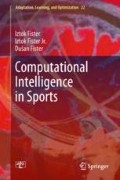Abstract
In the last chapter, the automatic generation of sports training plans using CI algorithms was presented, where it was expected that the their realization would be proceeded smoothly. However, realization of the proposed training plan can be disrupted when an athlete in training process ill or is injured. These unpredictable events can interrupt the training process for a day or two, or even for several weeks. In this case, the training plan becomes unusable and must be adapted.
Access this chapter
Tax calculation will be finalised at checkout
Purchases are for personal use only
References
Dick, F.W., Noakes, T., Werthner, P.: Sports Training Principles: An Introduction to Sports Science, 6th edn. Bloomsbury Academic, London, UK (2015)
Omalu, B.I., DeKosky, S.T., Hamilton, R.L., Minster, R.L., Kamboh, M.I., Shakir, A.M., Wecht, C.H.: Chronic traumatic encephalopathy in a national football league player: part ii. Neurosurgery 59(5), 1086–1093 (2006). https://doi.org/10.1227/01.NEU.0000245601.69451.27
Kennedy, J., Eberhart, R.: Particle swarm optimization. In: IEEE International Conference on Neural Networks, 1995. Proceedings, vol. 4, pp. 1942–1948. IEEE (1995)
DeWeese, B.H., Hornsby, G., Stone, M., Stone, M.H.: The training process: planning for strength–power training in track and field. part 1: theoretical aspects. J. Sport Health Sci. 4(4), 308–317 (2015). https://doi.org/10.1016/j.jshs.2015.07.003
Powers, S., Howley, E.: Exercise Physiology: Theory and Application to Fitness and Performance, 9th edn. McGraw-Hill Education, New York, NY (2014)
Kraemer, W., Denegar, C., Flanagan, S.: Recovery from injury in sport: considerations in the transition from medical care to performance care. Sports Health 1(5), 392–395 (2009). https://doi.org/10.1177/1941738109343156. PMID: 23015898
Kennedy, J., Eberhart, R.C.: The particle swarm optimization; social adaptation in information processing. In: Corne, D., Dorigo, M., Glover, F., Dasgupta, D., Moscato, P., Poli, R., Price, K.V. (eds.) New Ideas in Optimization, 3rd edn. McGraw-Hill Ltd., UK, Maidenhead, UK, England (1999)
Author information
Authors and Affiliations
Corresponding author
Rights and permissions
Copyright information
© 2019 Springer Nature Switzerland AG
About this chapter
Cite this chapter
Fister, I., Fister Jr., I., Fister, D. (2019). Adaptation of Training Plans. In: Computational Intelligence in Sports. Adaptation, Learning, and Optimization, vol 22. Springer, Cham. https://doi.org/10.1007/978-3-030-03490-0_8
Download citation
DOI: https://doi.org/10.1007/978-3-030-03490-0_8
Published:
Publisher Name: Springer, Cham
Print ISBN: 978-3-030-03489-4
Online ISBN: 978-3-030-03490-0
eBook Packages: Intelligent Technologies and RoboticsIntelligent Technologies and Robotics (R0)

